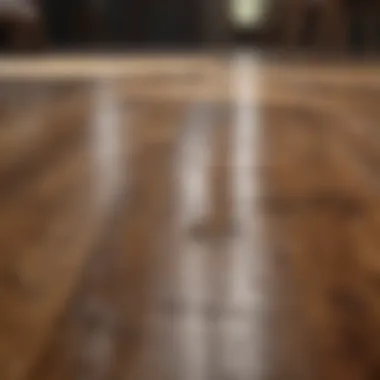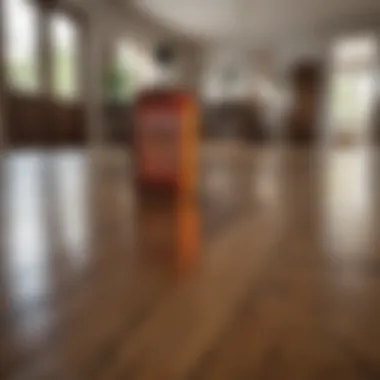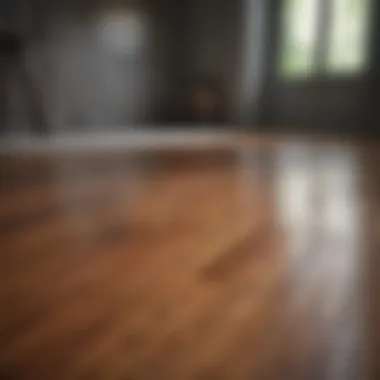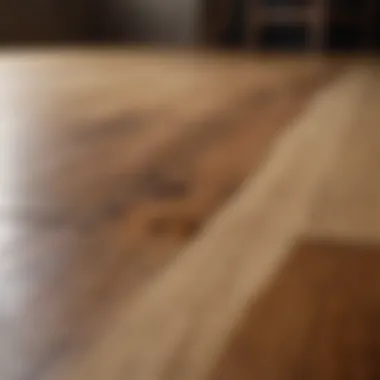Exploring the Efficacy of Vinegar for Hardwood Floor Cleaning: A Comprehensive Guide


Real Estate and Home Maintenance: Cleaning Hardwood Floors with Vinegar
Vinegar, a common household item, is often touted as a versatile and natural cleaning solution. However, when it comes to hardwood floors, the question arises - Is vinegar a suitable cleaner? In this comprehensive guide, we will delve deep into the effectiveness and potential risks associated with using vinegar on hardwood surfaces, providing valuable insights and best practices to help you make informed decisions for maintaining your floors' quality.
Exploring the Effectiveness of Vinegar
Vinegar, known for its acidic properties, can serve as an effective cleaner for various surfaces. Nonetheless, hardwood floors have specific requirements that must be considered before using vinegar. It is imperative to understand the chemical composition of vinegar and how it interacts with the finish and sealant of hardwood floors. Choosing the right vinegar type and dilution ratio is crucial to ensure optimal cleaning results without causing damage.
Understanding Potential Risks
While vinegar is prized for its natural cleaning abilities, there are potential risks associated with using it on hardwood floors. Excessive use of vinegar or using undiluted vinegar can erode the protective layers of the wood, leading to discoloration and surface damage. Moreover, certain types of hardwood may react unfavorably to vinegar, necessitating caution and patch testing before widespread application.
Best Practices for Cleaning
To effectively clean hardwood floors with vinegar, it is recommended to dilute vinegar with water in a suitable ratio. Utilizing microfiber mops or cloths can help minimize excess moisture on the wood surface. Regularly dusting and sweeping the floors before using vinegar can prevent scratches and abrasions. Implementing a gentle cleaning technique while ensuring thorough drying post-cleaning is essential for maintaining the luster and longevity of hardwood floors.
Synthesizing Information
In the realm of home maintenance, knowledge and prudence go a long way in ensuring the longevity and aesthetics of your living space.
For further information on hardwood floor care and maintenance, visit .
Prelims
Vinegar has long been debated as a suitable solution for cleaning hardwood floors. In this article, we delve deep into the effectiveness, risks, and best practices associated with using vinegar on hardwood surfaces. Understanding the nuances of this cleaning method is crucial for those looking to maintain the quality and appearance of their floors.


Understanding the Debate
History of Using Vinegar for Cleaning
Vinegar has a rich history as a cleaning agent, dating back centuries. Its acidic nature and antimicrobial properties have made it a popular choice for various cleaning purposes. In the context of hardwood floors, vinegar's ability to break down grime and disinfect surfaces make it a compelling option. However, its acidity levels need careful consideration to prevent damage to the floor finish.
Controversy Surrounding Vinegar as a Hardwood Floor Cleaner
The controversy surrounding vinegar as a hardwood floor cleaner stems from conflicting opinions on its effectiveness and potential risks. While some swear by its natural disinfectant properties and eco-friendly nature, others raise concerns about its impact on the pH levels of hardwood surfaces. The scent of vinegar after cleaning also divides opinions among users, making it a topic of debate in the cleaning community.
Pros and Cons of Using Vinegar
Understanding the importance of Pros and Cons of Using Vinegar in this article is crucial. Vinegar, a common household item, offers both benefits and drawbacks when used on hardwood floors. By exploring these aspects, readers can make informed decisions about its suitability for cleaning their floors. Vinegar's properties play a significant role in its efficacy for cleaning hardwood surfaces.
Benefits of Vinegar
Natural Disinfectant Properties:
Delve into the specifics of Natural Disinfectant Properties and how they contribute to the overall cleaning process. Highlight the key characteristic of Natural Disinfectant Properties, such as its ability to eradicate germs effectively. Natural Disinfectant Properties serve as a safer alternative to harsh chemical cleaners, providing a natural cleansing solution. Its gentle yet potent nature ensures thorough cleaning without compromising on safety.
Cost-Effectiveness:
Examine the aspect of Cost-Effectiveness and its impact on the cleaning regimen. Emphasize the affordability factor of using vinegar for hardwood floor cleaning. Cost-Effectiveness makes vinegar an attractive option for those seeking budget-friendly cleaning solutions. Its cost-efficient nature ensures economic benefits for users.
Environmentally Friendly:
Explore the idea of Environmentally Friendly attributes of vinegar and their relevance to the cleaning process. Discuss how vinegar aligns with eco-friendly practices. Environmentally Friendly characteristics of vinegar make it a sustainable choice, reducing the use of harmful chemicals in home cleaning routines. Its eco-conscious traits appeal to those prioritizing green living.


Drawbacks of Vinegar
Potential Damage to Finish:
Scrutinize the issue of Potential Damage to Finish caused by vinegar and its implications for hardwood floors. Highlight the key drawbacks, such as the risk of discoloration or deterioration. Potential Damage to Finish raises concerns about the long-term impact of vinegar use, necessitating caution during cleaning routines.
Irregularities in pH Levels:
Discuss the challenge posed by Irregularities in pH Levels due to vinegar usage. Address the importance of balanced pH levels for hardwood floor maintenance. Irregularities in pH Levels can disturb the floor's chemical equilibrium, potentially leading to surface damage or degradation over time.
Issues with Scent:
Examine the matter of Issues with Scent associated with vinegar as a cleaning agent. Describe the distinct smell of vinegar and its implications for indoor environments. Issues with Scent may deter individuals sensitive to strong odors from using vinegar consistently for cleaning purposes.
Best Practices for Cleaning Hardwood Floors
Cleaning hardwood floors is an essential task that requires careful attention to detail and the use of appropriate cleaning methods. In this article, we delve into the best practices for maintaining the cleanliness and quality of your hardwood floors to ensure they last for years to come. Whether you are a real estate enthusiast, a travel buff, or an interior design aficionado, understanding the optimal ways to clean hardwood floors is crucial.
Alternative Cleaning Solutions
Lemon and Water Mixture
The lemon and water mixture is a popular and effective alternative cleaning solution for hardwood floors. Its natural acidity helps to remove dirt and grime without damaging the wood finish. This mixture provides a refreshing scent while offering disinfectant properties, making it a go-to choice for eco-conscious individuals. However, it is essential to test this solution on a small inconspicuous area first to ensure compatibility with your specific hardwood flooring.
Commercial Hardwood Floor Cleaners
Commercial hardwood floor cleaners are specially formulated products designed to clean and protect hardwood floors. These cleaners often contain mild detergents and wood-safe ingredients to ensure a thorough clean without leaving residue. While convenient and easy to use, some commercial cleaners may contain chemicals that could potentially harm the environment or affect indoor air quality. It is advisable to research and choose environmentally friendly options if you opt for commercial cleaners.


Guidelines for Using Vinegar Safely
In this pivotal section of the article, we delve into the critical aspect of maintaining safety while utilizing vinegar as a cleaning agent for hardwood floors. Safety precautions are crucial to prevent any potential harm or damage to the flooring. By adhering to the guidelines for using vinegar safely, individuals can ensure the longevity and pristine condition of their hardwood surfaces.
Dilution Ratios
Recommended Vinegar to Water Ratios
When considering the dilution ratios for vinegar as a hardwood floor cleaner, it is imperative to strike the right balance between effectiveness and safety. The recommended vinegar to water ratios plays a vital role in achieving optimal cleaning outcomes without causing any adverse effects on the floor finish. By understanding the key characteristic of these ratios, users can make an informed decision regarding the suitable mixture to use for their cleaning needs. The unique feature of recommended vinegar to water ratios lies in its ability to harness the cleaning power of vinegar while ensuring that the acidity levels are within a safe range for hardwood surfaces. This balance is essential to prevent any potential damage that may arise from using undiluted vinegar or incorrect mixtures. By following the recommended ratios, individuals can leverage the benefits of vinegar as a natural cleaner while mitigating the risks associated with improper usage. It is recommended to experiment with different ratios on a small, inconspicuous area of the floor to determine the most effective and safe mixture before applying it to larger sections. Finding the optimal vinegar to water ratio is key to harnessing the cleaning prowess of vinegar while safeguarding the integrity of hardwood floors in the process.
Testing on a Small Area
Testing on a small area is an imperative step when considering cleaning hardwood floors with vinegar. This particular action holds significant importance due to its ability to serve as a preliminary assessment of how the vinegar solution interacts with the flooring surface. By testing a small, inconspicuous area first, individuals can determine any adverse effects or unwanted consequences before applying the solution to the entire floor.
One of the primary benefits of conducting this small-scale test is the opportunity it provides to observe the reaction of the wood finish to the vinegar. Certain hardwood finishes may react negatively to acidic solutions like vinegar, potentially leading to discoloration, dullness, or texture changes. Through this initial test, users can safeguard their floors from possible damage while preserving their aesthetic appeal.
Moreover, testing on a small area allows individuals to assess the impact of vinegar on the pH levels of the wood. In some cases, vinegar may alter the pH balance of the floor surface, which can be detrimental to its long-term integrity. By examining this aspect beforehand, users can make informed decisions about the suitability of vinegar as a cleaning agent for their specific hardwood floors.
Considering the unique scent of vinegar, testing on a small area also serves to evaluate whether the odor left behind is acceptable to the inhabitants of the space. Some individuals may find the smell of vinegar unpleasant or overpowering, necessitating the need to test its residual scent in a confined area to gauge its tolerability.
In essence, testing on a small area offers a proactive approach to hardwood floor maintenance, enabling users to identify potential risks, assess compatibility with their specific floor type, and make informed choices regarding the use of vinegar as a cleaning solution. It serves as a crucial preliminary step that mitigates the likelihood of unintended damage or unsatisfactory results, contributing to the overall care and preservation of hardwood flooring.
Important Note: Always remember to allow sufficient time for the test area to dry completely and observe it under different lighting conditions to accurately evaluate any effects of the vinegar solution.
End
In the realm of hardwood floor cleaning, the conclusive decision on whether vinegar is a suitable solution resonates with a blend of effectiveness, caution, and maintenance considerations. Throughout this comprehensive guide, the insight into the benefits, drawbacks, and optimal practices for vinegar application underscores the significance of making an informed choice in floor care. Striking the delicate balance between natural disinfectant properties and potential risks to the floor finishing, the debates surrounding the use of vinegar illuminate the nuanced landscape of floor maintenance methods. Embracing a meticulous approach to hardwood care is imperative to uphold the timeless elegance and durability of these surfaces.
Final Thoughts
Weighing the Options
Deliberating on the inclusion of vinegar in one's hardwood floor cleaning arsenal entails a meticulous analysis of its pros and cons. This pivotal decision-making process echoes the essence of prudent care and echoes the importance of sustainable practices. As real estate enthusiasts and interior design aficionados seek equilibrium between efficacy and risks, the concept of



